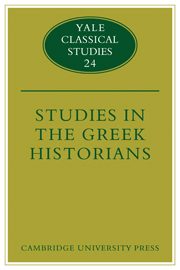Book contents
- Frontmatter
- Contents
- Preface
- In Memoriam Adam and Anne Parry
- Learning through suffering? Croesus' conversations in the history of Herodotus
- An Athenian generation gap
- Thucydides' judgment of Periclean strategy
- The speeches in Thucydides and the Mytilene debate
- Xenophon, Diodorus and the year 379/378 B.C. Reconstruction and reappraisal
- Aristotle's Athenaion Politeia and the establishment of the Thirty Tyrants
- Nearchus the Cretan
- Myth and archaeologia in Italy and Sicily – Timaeus and his predecessors
- Symploke: its role in Polybius' Histories
- Plutarch and the Megarian decree
- Herodian and Elagabalus
Symploke: its role in Polybius' Histories
Published online by Cambridge University Press: 06 December 2010
- Frontmatter
- Contents
- Preface
- In Memoriam Adam and Anne Parry
- Learning through suffering? Croesus' conversations in the history of Herodotus
- An Athenian generation gap
- Thucydides' judgment of Periclean strategy
- The speeches in Thucydides and the Mytilene debate
- Xenophon, Diodorus and the year 379/378 B.C. Reconstruction and reappraisal
- Aristotle's Athenaion Politeia and the establishment of the Thirty Tyrants
- Nearchus the Cretan
- Myth and archaeologia in Italy and Sicily – Timaeus and his predecessors
- Symploke: its role in Polybius' Histories
- Plutarch and the Megarian decree
- Herodian and Elagabalus
Summary
Polybius was not the first historian who claimed to write ‘universal’ history, as he admits; but the only one of his predecessors whose claim he concedes is Ephorus, and Ephorus in fact did not produce a history of the whole world, but merely combined a number of separate accounts of the Greek states in a single work. Polybius' Histories were universal in a different sense, for they dealt with a period in which (he tells us) events themselves had begun to interlock; and in his discussion of that process a great part is played by the concept of συμπλοκή. It is this concept and its relevance to Polybius' idea of universal history that I want to examine here. I do so in the hope that the subject may seem not inappropriate as a tribute to Adam Parry, whose keen interest in problems of literary composition was well known, and who had recently turned his attention to the field of Greek history.
Clearly Polybius attached great importance to the idea of συμπλοκή. ‘It is only from the interconnection of all the events one with another and from their comparison (συμπλοκῆς καὶ παραθέσεως), and from their resemblances and differences, that a man can obtain his object and, thanks to a clear view of these matters, can derive both profit and pleasure from history.’ This συμπλοκή, this linking together of events throughout the inhabited world, is not something available to all historians at will.
- Type
- Chapter
- Information
- Studies in the Greek Historians , pp. 197 - 212Publisher: Cambridge University PressPrint publication year: 1975
- 5
- Cited by

